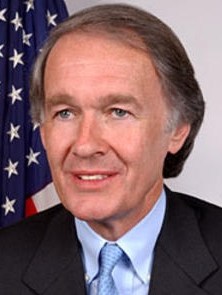
Rep. Ed Markey
Reps. Ed Markey (D-Massachusetts) and Anna G. Eshoo (D-California), both members of the powerful House Energy & Commerce Committee, introduced legislation Saturday to enact Net Neutrality concepts into federal law.
H.R. 3458, the Internet Freedom Preservation Act, is designed to assess and promote Internet freedom for consumers and content providers. The bill states that it is the policy of the United States to protect the right of consumers to access lawful content, run lawful applications, and use lawful services of their choice on the Internet while preserving and promoting the open and interconnected nature of broadband networks, enabling consumers to connect to such networks their choice of lawful devices, as long as such devices do not harm the network.
Both Markey and Eshoo are not new to the Net Neutrality fight, having introduced similar legislation in the past two sessions of Congress, but failing to generate enough support to overcome powerful telecommunications lobbyists pushing for its defeat.
Both believe the Obama Administration’s stated support for Net Neutrality will help the bill overcome similar challenges during the current session.

Rep. Anna Eshoo
The bill has a clear message for the nation’s Internet Service Providers – upgrade your networks to sustain traffic – don’t discriminate against it. The legislation’s framing language notes that most Americans face a monopoly or duopoly marketplace – one phone company and one cable company for their broadband needs. The legislation suggests under such circumstances, providers would be likely to engage in discriminatory behavior against the traffic they do not own, control, or partner with.
“The Internet is a success today because it was open to everyone with an idea,” said Rep. Markey. “That openness and freedom has been at risk since the Supreme Court decision in Brand X. This bill will protect consumers and content providers because it will restore the guarantee that one does not have to ask permission to innovate.”
While the bill does not specifically address Internet Overcharging schemes, like usage caps and discriminatory pricing practices, it demands fairness for even the most traffic intense services, and demands “reasonable traffic management” standards. What defines that will be left at the desk of the Federal Communications Commission, which might end up being a wild card. The bill affords no protection for copyright infringement or other illegal/illicit online activities.
Tim Karr at Free Press advocated for the immediate passage of the bill, defining seven reasons why Net Neutrality protection is essential:
1. Economic Recovery and Prosperity
“The Internet has thrived and revolutionized business and the economy precisely because it started as an open technology,” Eshoo said in a statement on Friday. The Internet is so closely tied to U.S. economic recovery that President Obama and Congress earmarked more than $7 billion to help build out more high-speed connections at a time when our economy needs it most.
Obama and Congress also recognized that the economy cannot benefit by building a closed Internet. The American Reinvestment and Recovery Act requires that all federally funded networks be services that meet “nondiscrimination and network interconnection obligations” — that abide by Net Neutrality.
2. Free Speech
Freedom of the press extends only to those who own one — or so the saying goes. It once rang true in a world ruled by newspaper chains, radio and television broadcasters, and cable networks. But the Internet has changed all that, delivering the press — and in theory its freedoms — to any person with a good idea and a connection to the Web.
This extraordinary twist to “mass media” has catapulted many an everyday YouTube auteur to celebrity-status, while turning ideas born in a garage or dorm room into Fortune 500 companies. It is the reason so many Americans are now passionate about protecting their free speech rights on the Internet.
The Internet Freedom Preservation Act would stop would-be gatekeepers from re-routing the free-flowing Web. “To meet other national priorities, and to our right to free speech under the First Amendment of the Constitution of the United States,” the bill says, “the United States should adopt a clear policy preserving the open nature of Internet communications.”
3. Civic Participation
New media are more participatory and personal than ever before and have opened up new avenues for people to become involved with local, state and national politics. We saw it during the 2008 presidential election when tens of millions expressed their support for Obama and McCain via interactive Facebook, Twitter and e-mail forums. We are seeing it in 2009 from the streets of Tehran to the work of organizations like the Sunlight Foundation and the Center for Responsive Politics, which use the Internet as the means to open governments to public scrutiny and accountability.
This wave of digital empowerment is the gathering force for a healthier democracy, and it all depends upon a more open, affordable and accessible Internet for everyone. Expanding Internet access alone doesn’t erase concerns over what kind of information people will find when they get online. Net Neutrality guarantees that we all have an equal opportunity to play a part.
4. The Marketplace of Ideas
The Internet was the great surprise of the 20th century. Sir Tim Berners-Lee created the standard that opened the World Wide Web to everyone with an idea and a connection. At that time, few could imagine that this open architecture would fuel such a powerful eruption of economic, social and political creativity.
The Internet Freedom Preservation Act “will protect consumers and content providers because it will restore the guarantee that one does not have to ask permission to innovate,” Rep. Markey said when he introduced the bill.
This is true regardless of your age, social status or location. Net Neutrality safeguards everyone’s fundamental right to an open Internet, making it possible for one person’s good idea to blossom into the next big business or, even, a movement of millions.
5. Social Justice
Broadband in America today is not equally accessible: Users are predominantly middle- or upper-class and live in urban or suburban areas. Poorer communities and communities of color, as well as communities in rural areas, have been largely left off the grid.
Imagine what it would mean, then, to provide a connection to disadvantaged areas without also extending to them Net Neutrality’s guarantee of openness. Dominant ISPs have argued for this exception, saying Net Neutrality prevents them from connecting more people. But it’s a false choice and far too high a cost to give network owners the power to shunt ideas percolating up from these communities to a digital backwater.
The Internet Freedom Preservation Act guarantees equal and unbridled access to the Internet’s engine of opportunity, leveling the playing field so that we all have a chance to be heard.
6. The Rise of the Gatekeepers
A high-speed connection is useful only if you can connect to everyone else online. Net Neutrality leaves control over your Internet experience with you, the user. Yet network operators are considering charging extra money depending on where you want to go and what you want to do online. Some are deploying technology that would sift through and filter the content that you share with others online. Such discrimination endangers the open and level playing field that has made the Internet so democratic.
As more of us rely upon a high-speed connection to do all things media — watch and make video, follow the news, listen to music, Tweet, email and call our friends — legacy media are too tempted to get in our way, steering us back via old channels where they make all decisions for us. But there’s no going back to the analog oligarchy. The Internet Freedom Preservation Act keeps the gatekeepers at bay.
7. The Obama Opportunity
Forces are coming into alignment for Net Neutrality. We have a president who is an outspoken supporter, congressional leadership willing to fight for an open Internet, and a pro-Neutrality chairman newly ensconced at the Federal Communications Commission.
Since the fight for Net Neutrality began more than three years ago, 1.6 million Americans have picked up the phone, signed petitions, spoken out publicly and written letters to urge their members of Congress to get behind Net Neutrality.
The tides have shifted. Still, giant phone and cable companies aren’t going away. They think they can squash our movement — and over the past six months alone, they have hired 500 lobbyists in Washington to try to stop this bill.
This is our best chance to beat them back once and for all.


 Subscribe
Subscribe



